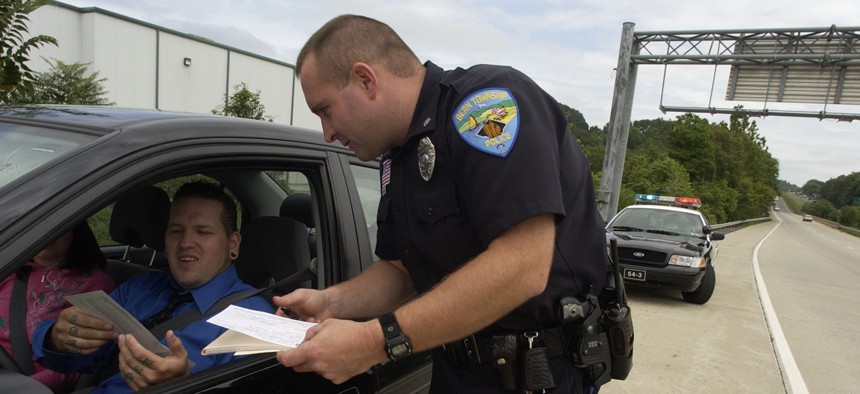Traffic Fines Lead to Potential 'Misaligned Fiscal Incentives'

Police officer giving a speeding ticket. GettyImages/MediaNewsGroup
More than 40 states use money generated from speeding tickets for criminal justice and other services, but even minor adjustments to shore up local budgets can hit individuals hard, according to a new report.
Speeding tickets aren’t just an aggravating part of driving, they also have become a critical component of funding police, courts and other government operations.
In fact, according to an Urban Institute report released Thursday, at least 43 states use money generated from speeding infractions to run their criminal justice systems.
The finding “reveals the potential for conflicts of interest and misaligned fiscal incentives,” wrote researchers Aravind Boddupalli and Livia Mucciolo in the report.
“Police officers and judges might levy fines and fees with the intent of funding their respective agencies,” something that the U.S. Department of Justice documented as part of its investigation into the police department of Ferguson, Missouri, they noted. Some researchers have even found that financially strapped towns in Massachusetts were more likely to issue speeding tickets than towns with more plentiful revenues, the Urban researchers added.
“To the extent that state-level allocations of revenues help determine how funds are eventually spent, our findings show cause for concern over the misaligned fiscal incentives and the potential for conflicts of interest over fines and fees,” the researchers wrote.
States also use fines and fees to fund general government services that have nothing to do with the justice system, such as special funds for health care or highway initiatives, the report points out.
Fines and fees are usually not a major source of income for states and localities. They only make up 0.7% of the Alabama state budget, for example, which is the highest for any state. Localities, especially smaller municipalities in the South, are slightly more reliant on fines and fees. But they still typically amount to less than 5% of general revenues.
Hardships for Individuals
But even minor adjustments to shore up local budgets can hit individuals hard, the Urban researchers said. Unpaid court debt can lead to suspension of driver’s licenses, loss of voting rights and even jail time.
The Urban Institute pointed out only 17 of the 43 states funding criminal justice systems with speeding tickets use money from the fines themselves. Fines are the punitive portion of the ticket that is meant to deter people from speeding again. But 39 states tack on fees to those tickets, which help support courts and law enforcement.
Those fees can make a simple speeding ticket a hefty expense. Kentucky, for example, adds $150 to the price of a ticket to support various programs. That includes $100 to cover court costs, a $20 court fee, a $10 charge to help fund jail medical services, and $10 to help pay for a task force on Internet crimes against children.
Those expenses are the same, regardless of a driver’s ability to pay them. That means they disproportionately harm lower-income people. And issuing more tickets can exacerbate racial disparities in the enforcement of traffic laws, the researchers warned.
“Legal rules that empower courts and law enforcement agencies to pursue revenue generation through the justice system can undermine public safety and trust. They can also exacerbate the racial disparities that underpin policing and sentencing practices across the United States,” they wrote.
Boddupalli, one of the authors, said states could look for ways to minimize the harm done by court fines and fees, such as giving drivers alternative ways of paying off their debt or ending the practice of suspending driver’s licenses for not paying them.
“Our overarching point is: Consider all those reforms. Yes, sure. But also first consider severing the link between the money coming in and who the money goes towards, so as to reduce the conflict of interest that comes with fines and fees,” Boddupalli said.






